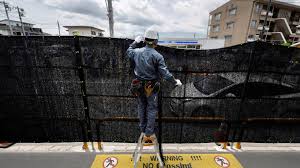
In a move aimed at curbing unruly tourist behavior, the town of Fujikawaguchiko has begun installing a large mesh barrier to block a popular Instagram-famous view of Mount Fuji. The plan, which made headlines last month, comes as local officials and residents grow increasingly frustrated with the unending streams of visitors, mostly foreigners, who litter, trespass, and break traffic rules.
On Tuesday morning, workers in hard hats were seen putting the finishing touches on metal poles, preparing to attach a screen measuring 2.5 by 20 meters (eight by 65 feet) across the road from a Lawson convenience store. This spot has become notorious for its perfect view of Japan’s highest mountain, leading to an influx of tourists who often engage in disruptive behavior.
Despite traffic signs and warnings from security guards, many tourists continue to cross the street non-stop, ignore red lights, park illegally, and smoke outside designated areas. “It’s regrettable we have to do this, because of some tourists who can’t respect rules,” a town official told AFP in April.
The barrier also aims to protect a nearby dental clinic, where tourists frequently park without permission and even climb onto the roof to take pictures. Although construction of the barrier was initially delayed due to material delivery issues, the project is now moving forward, offering tourists a few more days to capture their desired shots.
Japan has seen a record number of overseas tourists in recent months, with monthly visitors exceeding three million in both March and April. However, the influx has not been universally welcomed. In addition to Fujikawaguchiko, other tourist hotspots such as Venice and Kyoto have also struggled with the negative impacts of overtourism. In Kyoto, locals have reported tourists harassing the city’s famed geisha.
Efforts to manage the tourist influx include new measures at Mount Fuji, where hikers using the most popular route will be charged 2,000 yen ($13) each, and entries will be capped at 4,000 per day to ease congestion. A new online booking system for the Yoshida trail opened on Monday, ensuring hikers can secure entry through a new gate, though 1,000 places a day will be reserved for day-of entries.
During the July-September hiking season, more than 220,000 visitors ascend Mount Fuji’s steep, rocky slopes. Many climb through the night to witness the sunrise, often without taking breaks, leading to a significant number of injuries and illnesses. Regional officials have raised concerns about safety and environmental damage due to overcrowding on the active volcano, a symbol of Japan and a historically peaceful pilgrimage site.
Residents near other popular photo spots in the region, such as the Fuji Dream Bridge, have also complained about the adverse effects of overtourism in recent weeks. One tour operator offering day trips from Tokyo to the Mount Fuji area told AFP that they are now directing visitors to another Lawson store nearby, which offers a similar view but is less disruptive to local residents.
Sources By Agencies


